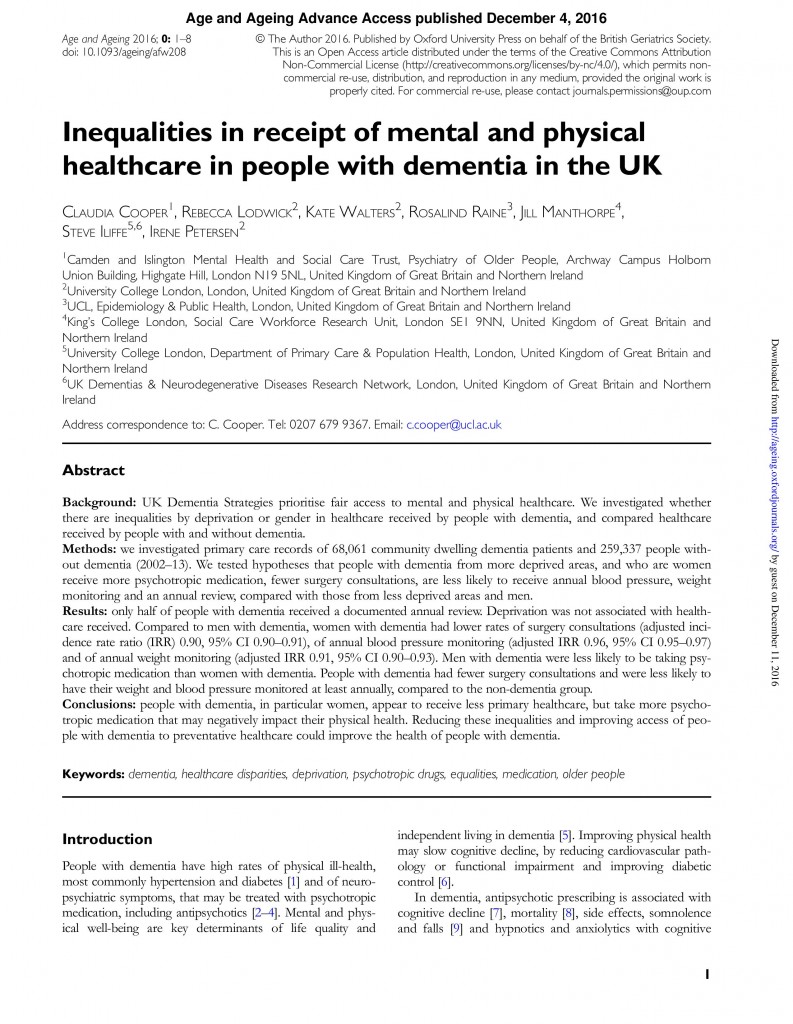 Claudia Cooper and Jill Manthorpe introduce their new article, which is open access in Age and Ageing. (726 words)
Claudia Cooper and Jill Manthorpe introduce their new article, which is open access in Age and Ageing. (726 words)
Women with dementia make fewer visits to the GP, receive less health monitoring and take more potentially harmful medication than men with dementia, our new research has found.
The study, published in Age and Ageing in early December, was funded by Dunhill Medical Trust. We found that only half of all people with dementia had a documented annual review even though GPs are offered financial incentives to carry these out. Women were at particular risk of staying on antipsychotic or sedative medication for longer. This might be because they have fewer GP appointments where their treatment can be reviewed.
‘As women tend to live longer than men, they are more likely to live alone without a family carer to help them get to their GP,’ says Dr Claudia Cooper from UCL Psychiatry who led the study team that included Professor Jill Manthorpe of the Social Care Workforce Research Unit at King’s College London. ‘Perhaps because of this, women are more at risk of missing out on medical or other help that might help them stay well for longer. We found that women were more likely to be on psychotropic drugs (sedatives or anti-psychotics), which can be harmful in the long term. Women were also tending to stay on such drugs for longer, perhaps because they have fewer check-ups to see if the drugs are still needed or working.’
Dr Cooper further commented, ‘Women with dementia who live on their own may need additional support accessing healthcare services. Their family and friends should proactively engage with these their doctors and nurses so that their condition is reviewed regularly to make sure their treatment plans, including any drugs, are appropriate. Improving access to healthcare and reducing psychotropic drug use in people with dementia, especially women, could help them to live well with dementia for longer.’
Prof Manthorpe added, ‘For anyone with dementia who relies substantially on their social care workers and who does not have relatives who can help them get to their GP, then their care and support plan should include making sure that they get the appointments and reviews they need.’
The researchers used the UK Health Improvement Network database which has details of 68,000 people with dementia and 259,000 people without dementia to compare their access to healthcare services. Overall, people with dementia received less medical care than those without even though they are more vulnerable to physical and mental illnesses.
‘Dementia can cause a wide range of physical complications, including difficulties swallowing and getting out and about,’ said Dr Cooper. ‘People with dementia are particularly susceptible to malnutrition as they may have difficulties eating, preparing food or remembering to eat. Previous research has shown that nearly half, about 45%, of people with dementia experience significant weight loss which can lead to further physical problems and frailty. However, despite this high risk, less than half of people with dementia get an annual weight check-up at their GP’s. The good news is that things seem to be improving: only 24% of people with dementia had their weight monitored in 2002 compared with 43% in 2013.’
‘There are clear implications here for social care providers,’ commented Prof Manthorpe, ‘It is not always easy for care workers to spot weight loss as there may not be much continuity of care and their calls may be very rushed. Care funders should value continuity of care and be alert to the need for care workers to be ‘the eyes and ears’ of other services.’
Improvements in weight monitoring by primary care services may be linked to the government’s National Dementia Strategy which was launched in England in 2009. Around this time, GPs were offered additional money through the NHS Quality and Outcomes Framework to review their patients with dementia annually. However, both Dr Cooper and Prof Manthorpe argue that there is still more work to be done to ensure that people with dementia, particularly women, are able to access the services they need from primary care and that social care services are part of the solution if they too have the capacity to support people with dementia.
Dr Claudia Cooper is Reader in Old Age Psychiatry, UCL. Jill Manthorpe is Professor of Social Work and Director of the Social Care Workforce Research Unit, King’s College London.
Read the article
The article, ‘Inequalities in receipt of mental and physical healthcare in people with dementia in the UK’, by Claudia Cooper, Rebecca Lodwick, Kate Walters, Rosalind Raine, Jill Manthorpe, Steve Iliffe, and Irene Petersen, is published in Age and Ageing, doi:10.1093/ageing/afw208